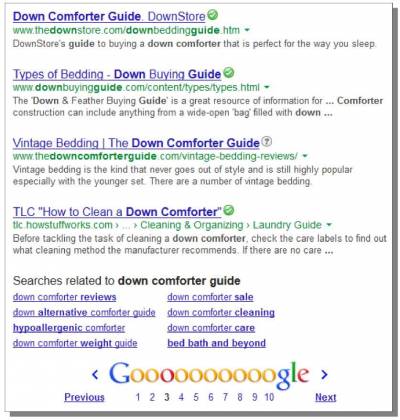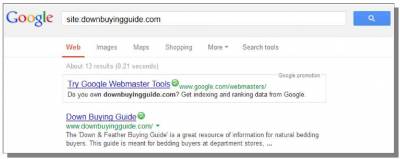Google Search Research
Now that I have a potential niche, I am going to go to Google Search to do some additional research on the keyword phrase. This research is going to help me gauge the level of competition for the phrase. If it turns out to be too high, I can simply find a different phrase to use for the same niche and try again until I find the right one. Doing the Google research after the Amazon research allows me to stay focused on the same niche (or a couple of niches) until I find the right phrase to use to target it. Once I find the right phrase, I can be very confident that I have made a good niche selection because I already looked into the Amazon products for the niche ahead of time. Quick Competition Gauge The first search is simply for the keyword phrase itself. I'm looking for the total number of search results that are provided for this phrase - 883,000 in this case. I do not have a specific number that I am looking for here. I have been able to easily rank sites when there are 5-10 million results available but had trouble with some phrases with even less results. For this reason, I use this number as a general gauge and also use it in combination with the other two search methods I'll discuss in just a moment. If you get a phrase that has billions of results, you will probably want to avoid it - you likely have some words in your keyword phrase that are too widely used on the internet for them to be considered a good target phrase. This number tells you how many other pages on the internet use this exact phrase somewhere in their content or use another phrase that is considered to basically mean the same thing. I will revisit this particular search in a bit, but for now, I am going to continue with a few other searches to gauge the overall competition of this phrase. For the second search, I enclose the keyword phrase in double quotes. This will tell me how many pages on the internet use this exact phrase somewhere in their content. For this search, I am again looking at the number of results, but this time I am looking for this number to be much lower than before. 19,100 results here is excellent to see - this tells me that only 19,100 other pages on the internet use this exact phrase. In general, I want to see this number below 100,000 (for the lowest competition). However, I have also ranked in the top 10 with more than 1.5 million results for this exact phrase search. Finally, I am looking for the number of pages on the internet that use this exact phrase in the title of the page. This is done by adding the word allintitle and then a colon to the front of the exact phrase search that was previously used. With this search, I am typically looking for a very low number. In general, anything under 1,000 could be considered to be very low competition. I often consider anything above 10,000 here to be high competition unless the other two numbers are significantly lower than expected. This could indicate that there are a decent number of people targeting the phrase with a page on their site but not many sites that are actually covering a lot on this subject overall. For this particular situation, the number of results is definitely higher than I usually like to see, but this is still a phrase that I am going to go for because of the other numbers and also to test the limits of this strategy. I still feel confident about getting a top 10 ranking on that phrase, but it is hard to say how much time it will take to make that happen (especially if I want the #1 spot). I have built sites that target a phrase with nearly 75,000 results for the allintitle search and managed a #8 spot, just to give you an idea of the potential upper limits of this strategy (that result could still be improved with more work and time though). More In-Depth Competition Research These results, as well as the others in the top 10, are all for larger websites that simply seem to have a page or possibly a section of their site devoted to this particular topic. Some people may look at the results and think 'How can I ever expect to beat Overstock.com and/or BedBathAndBeyond.com?', but I see it more like 'These guys don't stand a chance because there aren't any dedicated niche sites for this subject in these results!'. As I continue to look through the results, I want to find a site that seems to be solely devoted to this subject. I was able to find a couple of these sites towards the bottom of the third page of results, which I have shown below - the top 3 results in this picture all look to be sites that may be devoted to this subject. If possible, I am looking to find a site where the home page is ranking for this term, but I have still not been able to find one of them in the top three pages, so I will stick with one of these sites that looks to be devoted to the subject. I have selected DownBuyingGuide.com to use for this competition research. I then want to take that domain and use it for a Google search to find out how many pages the site contains. This is done by adding the word site, then a colon, and then the domain name to the Google Search bar, as shown below: This search shows 13 results, which tells me that this site has 13 pages on it that are indexed in Google, so it took them 13 pages of content to reach a rank of #28. This looks to be a good indication, since I'm not 100% convinced that the site is really devoted to the exact subject (I could look at the site itself to find out more) and it wouldn't be hard to build a site with more than 13 pages of content, especially if that content is targeted better. Again, this is just research that you can do to get a general indication in terms of the amount of work you may need to do to be able to rank for your primary keyword phrase. You can also replace the word site in that search with the word link to find how many indexed backlinks there are for this site in Google. Google does not show all links to a site - just ones that it considers to be legitimate and/or important. If you find that a site has a lot of links, especially from respected websites, it could indicate higher competition (depending on where that site is ranked). I am typically not looking to rely on backlinks to rank my websites though, so I am mainly interested in ensuring that an enormous amount of backlinks won't be needed to rank for this term (you can always add more content to a site to make up for a lack of backlinks though, which is my preferred method of building rank for a site). © Google Research >>> Back to TABLE OF CONTENTS <<< | |
| Views: 520 | |
| Total comments: 0 | |





